- More
- Back
Characters are the lifeblood of a story, the vessels through which we navigate own experience and enjoyment of a story. Plot will only take you so far. Without great characters we wouldnt care – or at least I wouldn’t. I have always been captivated by characters that are not just constructs of fiction, but mirrors reflecting the multifaceted nature of humanity in all its varied forms.
These twelve characters are embodiments of that depth and dimension. Each, in their unique way, contributes significantly to their respective narratives, driving the plot and engaging the reader’s imagination. Their motivations, struggles, triumphs and flaws are crafted so skilfully that they leap into our world, urging us to follow them from page to page – caring what will happen to them next – rooting for them, and sometimes against them.
As such, they become more than mere characters; they are the drivers of story, captivating us with their journey and inspiring us to read more, demanding to know what happens to them.
Becky is the ultimate woman… the ideal. She’s a woman who can control her environment (including men) and uses her appeal so brilliantly because the men then underestimate her formidable brain.
And like all the best books, Vanity Fair is timeless. As relevant today as it was when it first came out well over 150 years ago.
Some people may be surprised that I’ve put a woman at number one, but they shouldn’t be – we all know they are superior to men, or at least those I know.
I’ve lived with an amazing woman for the past 57 years. As well as being Chairman of the Science Museum, Mary has run one of the country’s great hospitals, she’s a Dame of the British Empire. She is my number one!
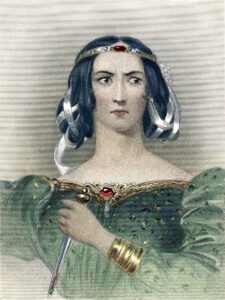
Whenever I get asked if Shakespeare still matters in this modern era, I say, “Imagine that you don’t know the ending of Romeo and Juliet and you started reading it.
Would you want to know what happened?” Of course you would. You’d be on the edge of your seat! We know his stories so well that we forget what an incredible storyteller he was.
I have seen a few Lady Macbeths in my time, and love the character. My favourite portrayal has to be Diana Rigg at the National in 1972, with Anthony Hopkins as Macbeth.
Her performance was so mesmerising and overpowering. I remember sitting in the audience thinking, “You want me to murder him? No problem”.
Characters must make us feel something – mostly to care – and this one could lead me to murder!
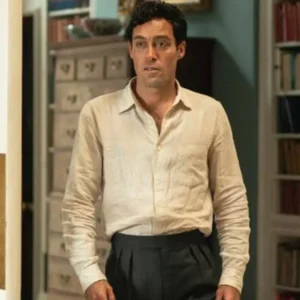
Starting with her first book, Riders, Jilly (conflict alert – a friend) introduces to the iconic Rupert Campbell-Black, a figure who embodies both charisma and complexity.
Rupert is the quintessential rake: charming, roguish and badly – but for some, irresistibly! – flawed. He’s a character you love to hate, yet some can’t help but admire and are even attracted to him for his audacious spirit.
What sets Cooper’s writing apart – particularly her portrayal of Rupert – is her ability to blend wit with a keen observation of the actual world around her as well as draw you into her fantasy Rutshire life.
As well as being a testament to Cooper’s storytelling prowess, Rupert’s journey through the series reflects the complexities of life, love, ambition and redemption, themes that have always resonated with me both as a reader and a writer.
Rupert Campbell-Black is a literary icon, representing the best of what character creation can achieve when portrayed by a great storyteller.
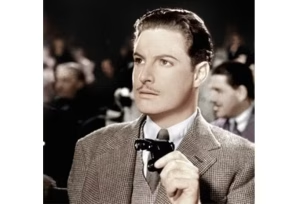
This is on the list partly for sentimental reasons. In one of those weird coincidences, Buchan was at Brasenose College, as I was; he went into politics, as I did; he wrote books, as I try to do; and he died on the day I was born.
I read it for the first time as a teenager and loved all the schoolboy adventure heroics – good guys versus bad guys, exciting chase scenes – but I still re-read it every few years and it’s lost none of its dramatic punch.
I love the book, but mostly I love Richard as a character.
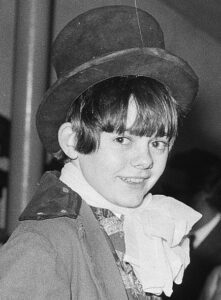
With Dickens, you could almost pick any major character from any book; each one is a work of genius.
I settled on Oliver Twist because of the sheer number of incredible characters. You’ve got Fagin, Bill Sikes, Mr Bumble, Nancy. And I chose the Dodger simply because of how he leaps off the page; his language, his movements. Lord knows how many versions have been made for film, stage and TV, but they have to keep on making ’em because it’s so damn good. Dickens is a hero to all storytellers!
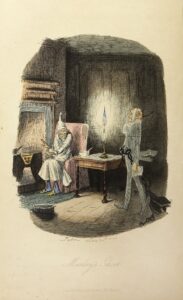
You could argue that Scrooge has become as much a part of Christmas as Santa Clause and the Christmas tree. As a writer, you need to be able to observe people and Dickens was the observer par excellence. He lived in central London at a time when London was the greatest city on earth; all human life was there. He would have met miserable so-and-sos like Scrooge. Perhaps taken a bit from here, a bit from there, and you end up with this colossus of a character that drives numerous adaptations- but the original is the best!
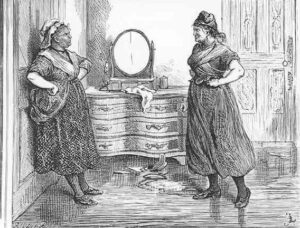
Should I apologise for including three Dickens characters in my Top 12? I don’t think so. This is Dickens we’re talking about. Madame Defarge is, of course, a wrong ’un, the villainess of the piece. But – and this is what Dickens does so well – you still care about her.
You still want to know what happens to her. This might sound a bit obvious, but for any story to work, you have to care about the characters.
Some years ago, I went to see a film with a very famous, good-looking American actor in the leading role. Part way through the plot, a woman threatens to cut his throat and I heard someone behind me say, “For God’s sake, just kill him, then we can all go home”. If your audience feels that way about your characters, it’s game over.
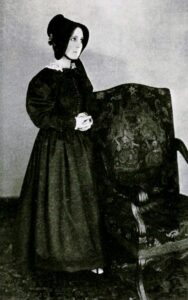 8. Jane Eyre – JANE EYRE by Charlotte Bronte (1847)
8. Jane Eyre – JANE EYRE by Charlotte Bronte (1847)Here we are talking about history’s great storytellers and this is a woman who could justifiably claim to be the greatest of them all.
Why? Because she writes a book about one woman looking for a husband and it’s fantastic.
Then, she writes a book about two women looking for husbands and it’s even better.
Then, it’s three women and four women. And what’s the common thread?
They are all superbly written and they all make you want to turn the page, and not go to bed. They are quintessentially unputdownable.
Some writers have to work hard at their craft, but with Bronte, it was a God-given talent above almost all others (plus some hard work I expect).
One of literature’s most beautifully written parts and I’ve seen some amazing actresses play her over the years.
As a writer, I generally fall in love with a character on the page, but when you get the right person playing the part on stage or screen it adds an extra dimension. For instance, David Suchet playing Hercule Poirot or Donald Sinden as Malvolio.
Elizabeth Bennet must be a lot of fun to play, too, because she dominates the whole book.
Yes, she’s an absolute menace, a busybody, and she’s always scheming to get her daughters married off, but she is also a wonderful, genuine human being.
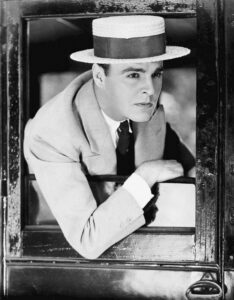
Like so much of Fitzgerald’s writing, this book is both believable and beautiful.
When you read it, you are right there in that world; he captures you completely.
The title, of course, refers to Carraway’s rich Long Island neighbour, Jay Gatsby, but so much of this is Nick’s story. His fascination and eventual disillusionment with Gatsby and his cronies.
Now, regarded as a classic, people forget that in the year before Fitzgerald died, this book sold just 17 copies.
He was seen as a has-been, a failure, a drunk… reduced to drinking meths with his wife. Unfortunately, it was only after his death that people realised how good he was. More “careless people.”

My mother was a great fan and she was the one who introduced me to the Molesworth books, written by Willans after he tired of his St. Trinian’s stories. As you’ve probably guessed from the title, it’s another school series, set in an English prep school called St. Custard’s and narrated by the illustrious Molesworth.
I’m sure some of the very clever humour went over my head when I first read them as a boy, but I still enjoyed the huge sense of silliness. I have the privilege and honour of having Searle’s original cartoon for the follow-up, How to be Topp: A Guide to Sukcess for Tiny Pupils, Including All There is to Kno about Space, in my kitchen. Every time I look at it, I have to smile.
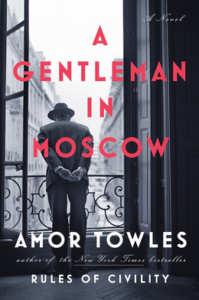
Rostov is a character who I find both fascinating and inspiring. His story of strength and elegance in the face of adversity resonates deeply with me. Confined to a hotel for decades, he exemplifies grace, intellect and a zest for life that is truly admirable.
Towles’ writing is remarkable, but it’s his portrayal of Rostov that stands out. The Count’s adaptability and his undiminished spirit in an ever-changing Russia are a masterclass in character development. As an author who enjoys delving into the subtleties of human character, I was immediately drawn to Rostov’s depth, his sense of honour and his ability to find joy and purpose in every situation.
A Gentleman in Moscow is not just a story about a man in confinement; here is a celebration of resilience and the enduring power of dignity and kindness.
For more articles, please visit the Unputdownable Article page, or the Unputdownable Podcast.
Or please read or listen to Chapter 1 of An Eye For An Eye for free.